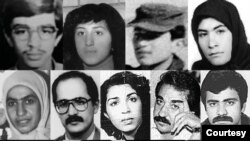International rights activists pressing for a U.N.-authorized investigation of Iran’s 1988 mass killings of political prisoners got a boost this week from a supportive letter by U.N. rights experts, but the activists’ long-running campaign for such a probe faces several uncertainties.
In the letter published online Wednesday, the six U.N. Special Rapporteurs and the Working Group on Enforced or Involuntary Disappearances warned Iran that if it continues to “refuse its obligations” under international human rights law to investigate the 1988 mass killings and their aftermath, the experts will call for a first-ever “international investigation” of those killings as potential crimes against humanity.
The experts had sent the letter privately to Iran on Sept. 3 and withheld it from public release until this week.
Human rights groups have said Iran's Islamist rulers secretly executed thousands of imprisoned political dissidents in 1988 and buried them in unmarked mass graves. Iranian leaders have refused to acknowledge the killings.
London-based rights group Amnesty International welcomed the U.N. experts’ letter as a boost to its two-year campaign for the U.N. to set up an independent investigation of the killings.
The call for an investigation was a key part of the group’s 2018 report on what it called the 1988 massacres and Iran’s efforts in the following 30 years to “torment” relatives by refusing to tell them how and why their loved ones were killed. The report also found that none of the Iranian officials involved in the killings had been brought to justice and some were holding or had held positions of power.
But the U.N. experts’ letter left uncertain how much time they would give Iran to respond to their repeated appeals for action before they call for an international investigation.
Amnesty International’s Iran researcher Raha Bahreini told VOA Persian she did not know the U.N. experts’ timeline for taking their threatened next step against Iran.
“We are hopeful that given the experts’ deep understanding of the climate of impunity that prevails in Iran, they would not wait much longer because their intervention was already long overdue,” Bahreini said. “With their letter, though, they clearly have flagged that they are prepared to call for an international investigation, and this is kind of their last warning to Iran before they escalate this issue within the U.N. human rights system.”
Another uncertainty is how Iran may respond to the U.N. experts’ threat to call for the Islamist-ruled nation to be investigated. There was no reaction in Iranian state media to the letter by late Friday.
Bahreini said U.N. member states should not expect Iran to change its long record of inaction. “Given Iranian authorities’ refusal to cease and address the rights violations (stemming from the mass killings), it is essential for the international community to take action to counter impunity,” she said.
A third uncertainty is whether the 47 nations of the Geneva-based U.N. Human Rights Council (HRC), the U.N. body most likely to authorize an investigation of Iran, will do so anytime soon.
In a Friday message to VOA, HRC media officer Rolando Gómez said the council was set up specifically to address reports of human rights atrocities such as those outlined in the U.N. experts’ letter. But he added: “As a state-driven body, it remains exclusively the prerogative of the 47 (member) states regarding how to address this.”
Gómez noted that HRC has adopted 10 previous resolutions demanding that Iran take action to improve its human rights situation.
“To date, HRC members have failed in their duty to take up Iran’s crimes against humanity for action, and this has only emboldened Iranian authorities to commit further crimes,” Bahreini said. “It's time for HRC members to adopt a resolution to establish an independent mechanism to ensure that the victims of these crimes receive an effective remedy.”
U.S. Assistant Secretary of State for Democracy, Human Rights, and Labor Robert Destro expressed support for an independent investigation of Iran’s 1988 mass killings with a Thursday tweet marking U.N. Human Rights Day, saying Tehran is unlikely to investigate itself due to the presence of alleged perpetrators of the killings among its current senior leadership.
“The regime has failed to provide families an accounting of the fate of their loved ones,” Destro wrote. “Instead, they threaten families and desecrate gravesites. Iranians deserve justice. We urge the international community to hold the regime accountable to the U.N.'s demands.”
The Trump administration withdrew from the world body’s HRC in 2018, saying it "makes a mockery of human rights” by displaying “unending hostility” toward Israel, a democracy and key U.S. ally, while acting as a “protector of human rights abusers.”
This article originated in VOA’s Persian Service. Behrooz Samadbeygi contributed.











